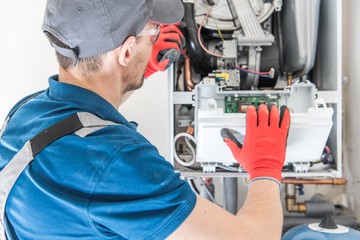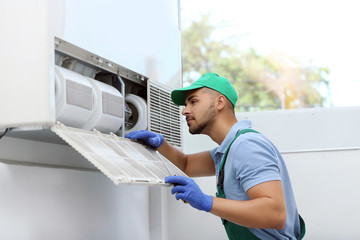Knowing how to keep your AC running smoothly year-round ensures consistent comfort and prevents unexpected breakdowns. An air conditioning system plays a crucial role in maintaining a comfortable indoor environment, especially during extreme weather conditions.
Regular maintenance and proper care are essential to keep the system functioning efficiently and to extend its lifespan. Contact Round Rock AC Repair for professional help.
Many homeowners overlook the importance of routine AC maintenance until problems arise, which can lead to costly repairs and reduced performance. Understanding how to maintain an AC system and adopting good habits can help avoid these issues and keep the unit operating at its best throughout the year.
One of the most important factors in maintaining an AC system is keeping the air filters clean. Air filters play a key role in trapping dust, dirt, and other airborne particles, preventing them from circulating through the system and into the living space. Over time, these filters can become clogged with debris, reducing airflow and causing the system to work harder to maintain the desired temperature. This increased strain can lead to higher energy consumption and increased wear and tear on the system’s components. Cleaning or replacing the air filters regularly ensures proper airflow, improves indoor air quality, and reduces the workload on the system.
Another crucial aspect of AC maintenance is keeping the coils clean. The evaporator and condenser coils are responsible for absorbing and releasing heat, allowing the system to cool the air efficiently. Dirt and debris can accumulate on these coils over time, reducing their ability to transfer heat effectively. When the coils are dirty, the system must work harder to achieve the desired temperature, leading to increased energy consumption and potential overheating. Cleaning the coils periodically helps maintain efficient heat exchange, reduces energy costs, and prevents strain on the system’s compressor and other components.
Ensuring that the condensate drain line is clear and unobstructed is also important for AC maintenance. The condensate drain line removes the moisture that the system extracts from the air during the cooling process. If this line becomes clogged with dirt, algae, or mold, water can back up into the system and cause leaks, water damage, and increased humidity levels indoors. Regularly checking and cleaning the condensate drain line prevents blockages, reduces the risk of mold growth, and helps maintain proper humidity control within the home.
Maintaining proper refrigerant levels is essential for optimal AC performance. Refrigerant is the substance that absorbs and releases heat, allowing the system to cool the air effectively. Low refrigerant levels can result from leaks or improper installation, causing the system to lose its cooling capacity and work harder to maintain the desired temperature. This increased workload can lead to compressor damage and other mechanical issues. Checking the refrigerant levels periodically and addressing any leaks or deficiencies ensures that the system operates efficiently and maintains consistent cooling performance.
The thermostat plays a key role in regulating the operation of an AC system. A malfunctioning or poorly calibrated thermostat can cause the system to cycle on and off too frequently or fail to maintain the desired temperature. Ensuring that the thermostat is properly calibrated and functioning correctly helps the system maintain consistent comfort levels and prevents unnecessary strain on the components. Upgrading to a programmable or smart thermostat allows for more precise temperature control and can help reduce energy consumption by adjusting the settings based on occupancy and outdoor conditions.
The outdoor unit of an AC system requires regular attention to ensure optimal performance. Leaves, grass, dirt, and other debris can accumulate around the outdoor unit, obstructing airflow and reducing the system’s ability to release heat effectively. Ensuring that the area around the outdoor unit is clear of debris and maintaining proper clearance allows for adequate airflow and efficient heat exchange. Trimming vegetation and cleaning the fins and coils of the outdoor unit also help maintain peak performance and prevent overheating.
Electrical components and connections within an AC system can deteriorate over time due to wear and exposure to moisture and heat. Loose or corroded connections can cause the system to malfunction, trip circuit breakers, or experience intermittent operation. Inspecting and tightening electrical connections, testing the capacitor and contactor, and ensuring that all wiring is secure helps prevent electrical failures and extends the lifespan of the system. Professional inspection and maintenance of the electrical components ensure that the system operates safely and efficiently.
The ductwork within an AC system plays a critical role in distributing cooled air throughout the home. Leaks, holes, or gaps in the ductwork can reduce airflow and cause uneven cooling, forcing the system to work harder to maintain the desired temperature. Inspecting and sealing any leaks in the ductwork improves airflow, enhances cooling efficiency, and reduces energy consumption. Proper insulation of the ductwork also helps maintain consistent temperatures and prevents energy loss.
The blower motor and fan are essential components that circulate air through the system and into the living space. Dirt and dust buildup on the blower motor and fan blades can reduce airflow and cause the motor to work harder, leading to increased energy consumption and potential overheating. Cleaning the blower motor and fan blades, lubricating the motor bearings, and ensuring that the fan is balanced and aligned help maintain efficient airflow and prevent mechanical issues. Regular maintenance of the blower motor and fan improves overall system performance and ensures even cooling throughout the home.
The system’s air vents and registers should be kept clean and unobstructed to maintain proper airflow. Dust, pet hair, and debris can accumulate in the vents and registers, reducing airflow and creating uneven cooling. Vacuuming the vents and registers regularly and ensuring that furniture or other objects are not blocking them helps maintain consistent airflow and improves indoor air quality. Adjusting the vents and registers to direct airflow evenly throughout the home also enhances comfort and prevents hot or cold spots.
Seasonal maintenance is key to keeping an AC system running smoothly year-round. Before the cooling season begins, it is important to perform a comprehensive inspection and maintenance check to ensure that the system is ready to handle increased demand. Cleaning the coils, checking the refrigerant levels, inspecting the electrical components, and testing the thermostat are essential steps in preparing the system for peak performance. After the cooling season ends, a thorough inspection and maintenance check help prevent issues during the off-season and ensure that the system is in good condition for the next cooling season.
Preventive maintenance contracts with professional HVAC technicians can help ensure that an AC system receives regular inspections and tune-ups. Professional maintenance includes checking and cleaning the coils, testing the refrigerant levels, inspecting the electrical components, and ensuring that all parts are functioning correctly. Technicians can identify and address minor issues before they develop into major problems, extending the lifespan of the system and improving overall efficiency. Professional maintenance also helps maintain warranty coverage and ensures that the system complies with manufacturer specifications.
Proper insulation and weatherproofing of the home also contribute to the efficient operation of an AC system. Sealing gaps and cracks around windows, doors, and walls prevents conditioned air from escaping and reduces the workload on the system. Installing window coverings, such as blinds or curtains, helps reduce heat gain from sunlight and improves overall cooling efficiency. Maintaining consistent indoor temperatures and reducing heat gain helps the AC system operate more efficiently and reduces energy costs.
Monitoring the performance of an AC system and addressing any changes in operation promptly helps prevent breakdowns and costly repairs. If the system begins to make unusual noises, cycle on and off frequently, or fail to maintain consistent temperatures, immediate attention to these issues can prevent further damage. Scheduling professional inspections and maintenance at the first sign of trouble ensures that the system remains in good working condition and avoids more extensive repairs.
By following these maintenance practices and investing in regular professional inspections, homeowners can keep their AC systems running smoothly year-round. Proper care and attention to the system’s components, electrical connections, and refrigerant levels ensure that the AC system operates efficiently, provides consistent comfort, and lasts for many years. Taking a proactive approach to AC maintenance not only improves performance and energy efficiency but also reduces the risk of unexpected breakdowns and costly repairs.


